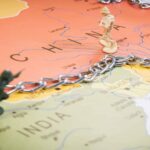Top diplomats also urge warring sides in Sudan to end hostilities and demand the Taliban reverse the ban on women working for the UN.
The foreign ministers of G7 have pledged to intensify sanctions against Russia over its war in Ukraine and criticised China for its actions in the Taiwan Strait and disputed South China Sea, urging Beijing “to act as a responsible member of the international community”.
The comments, issued on Tuesday, marked the conclusion of a three-day meeting in the Japanese resort town of Karuizawa.
Russia’s current offensive is largely stalled and Ukraine is preparing a counteroffensive, but there is widespread global worry about Russian President Vladimir Putin’s repeated threats to use tactical nuclear weapons.
“Russia’s irresponsible nuclear rhetoric and its threat to deploy nuclear weapons in Belarus are unacceptable,” the ministers said.
They added that any use of chemical, biological or nuclear weapons in Ukraine “would be met with severe consequences”.
Putin had said last month that Russia would station shorter-range, so-called tactical nuclear weapons on its neighbour’s territory, a move that marked the first time Moscow had said it would place nuclear weapons on the territory of another country since the end of the Cold War three decades ago, and appeared to raise the stakes, at least symbolically.
Taiwan, North Korea
On China, the G7 ministers reiterated their call for China to act as a responsible member of the international community, agreeing that peace and stability in the Taiwan Strait was “an indispensable element in the security and prosperity in the international community”.
The ministers reiterated that there was “no legal basis” for China’s expansive maritime claims in the South China Sea, and opposed Beijing’s militarisation activities in the region.
Meanwhile, Chinese Foreign Ministry spokesman Wang Wenbin condemned the statements, saying the G7 foreign ministers had “rudely interfered in China’s internal affairs, maliciously slandered and smeared China”.
“The statements were filled with arrogance, prejudice, and sinister intentions to suppress China,” he said during a press conference in Beijing, adding that China made a “strong demarche to the host Japan”.
On North Korea, the statement demanded Pyongyang “refrain” from further nuclear tests and ballistic missiles, warning of a “swift, united, and robust international response” should such actions continue.
The warning comes days after North Korea said it had successfully tested a solid-fuel intercontinental ballistic missile (ICBM), hailing it as a breakthrough for the country’s nuclear counterattack capabilities.
That launch was the latest in a string of banned weapons tests conducted by North Korea, which has already fired several of its most powerful ICBMs this year.
“We strongly condemn North Korea’s unprecedented number of unlawful ballistic missile launches, including the April 13 launch of what North Korea claimed as a solid-fuel intercontinental ballistic missile,” the G7 ministers said.
“Each of these launches violated multiple United Nations Security Council resolutions,” they added.
Sudan, Myanmar
On Sudan, the ministers urged General Abdel Fattah al-Burhan, who heads the military, and his rival, Mohamed Hamdan Dagalo, who commands the paramilitary Rapid Support Forces (RSF), to “end hostilities immediately” and return to negotiations.
The fighting, which erupted on Saturday over a disagreement on integrating the RSF into Sudan’s military, has killed nearly 200 people and forced the closure of the country’s international airport.
The G7 ministers warned that the fighting “threatens the security and safety of Sudanese civilians and undermines efforts to restore Sudan’s democratic transition”.
They urged a return to negotiations and called on all sides to “take active steps to reduce tensions and ensure the safety of all civilians, including diplomatic and humanitarian personnel”.
The ministers also condemned the ongoing violence in Myanmar, where the military staged a coup two years ago and is engaged in nationwide battles with civilian militias opposed to its rule, expressing deep concern over the deteriorating security and humanitarian situation in the Southeast Asian country.
They also slammed the Taliban’s “systematic abuses of human rights of women and girls”, denouncing the group’s bans on female higher education and work.
“We call for the immediate reversal of unacceptable decisions restricting human rights and fundamental freedoms, including the latest bans prohibiting Afghan women from working for NGOs and the UN,” they said.
Source : Aljazeera
















Add Comment